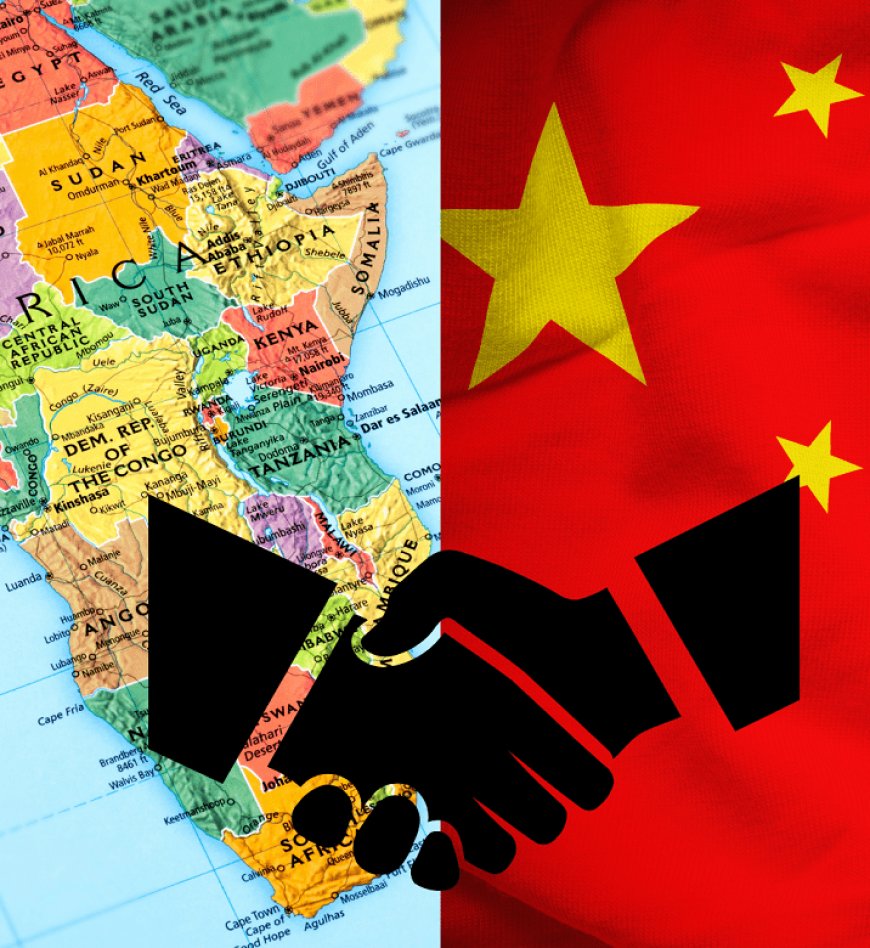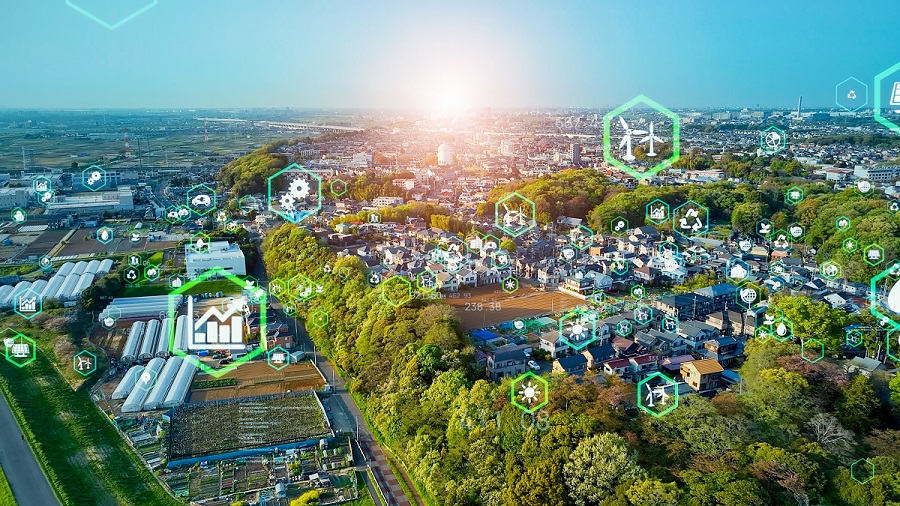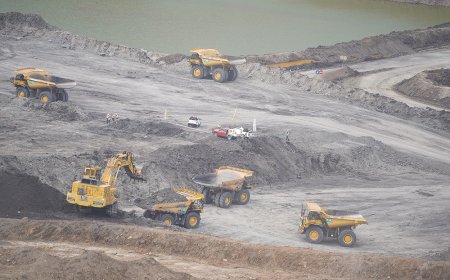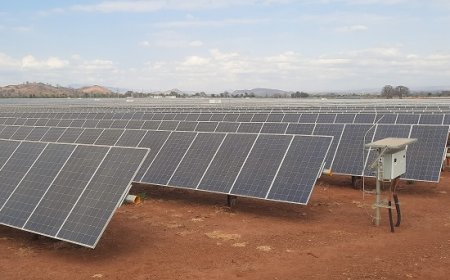About the Series
APRI is actively generating knowledge and shaping debate on key topics related to energy and climate diplomacy, aiming to strengthen the relationship between Europe and Africa. The Green and Transition Minerals Collection provides in-depth African perspectives, empowering policymakers to leverage resources essential for Europe's energy transition and Africa's industrialization.
Summary
Africa possesses abundant reserves of rare earth minerals, critical raw materials and key elements crucial for renewable energy technologies. Furthermore, the current geopolitical climate marked by the rivalry between China, the U.S. and Europe, positions Africa to play a key role in the global energy transition. To unlock this potential, several key policy shortcomings need to be addressed.
First and foremost, Africa needs to prioritize securing its own energy supply - leveraging international partnerships to develop key infrastructure projects can help boost domestic and intra-African energy consumption and increase its export capacity. Second, expanding Africa’s energy production capacity for export globally without adding value through beneficiation can lead to unsustainable investments which may not benefit future generations. Third, utilizing the continent’s reserves of critical raw materials can reduce its dependence on global superpowers and better navigate an increasingly polarized world.
Introduction
The global energy transition is at a critical crossroads. As nations and international organizations increasingly embrace greener and cleaner energy resources, the growing demand for critical minerals creates an expanding market opportunity for Electric Vehicle (EV) batteries, solar and wind power, and other alternatives to fossil fuels. The African Natural Resource Management and Investment Center of the African Development Group reports that 62% of Africa’s GDP relies on natural resources and essential ecosystem services (AfDB, 2023). As global demand for cleaner energy intensifies, the annual demand for metals used in lithium-ion batteries will continue increasing. Demand for cobalt, manganese, phosphorus, iron, graphite, nickel, lithium, aluminum and copper is projected to more than quadruple. This presents a serious opportunity for African countries to expand their exports, to leverage their reserves for better deals and improve environmental, socio-economic, and governance conditions for their residents.
As Africa’s largest trading partner and foreign direct investor, China has become a major trade partner for the continent. This brief examines the involvement of Chinese actors in Africa’s mining industry and argues that without value addition and advancement up the supply chain ladder, the continent’s critical mineral reserves risk perpetuating the resource curse narrative. The brief offers policy recommendations for both African decision-makers and their international partners towards ensuring that Africa can truly benefit fully from its resources.
China in Africa’s Mineral Sector1
Over the last two decades, China, mainly through state-owned enterprises, has come to dominate the African market in various sectors including mining, both in terms of investments and consumption. In 2022, China-Africa trade volume neared USD 300 billion (EUR 270 billion), tripling the trade volume between the US and African countries (Bociaga, 2023). Chinese mining and battery companies have also invested USD 4.5 billion (EUR 4 billion) in lithium mines in recent years, driving many lithium projects in countries like Namibia, Zimbabwe, and Mali. China’s investments in 15 out of 17 cobalt mining operations of the Democratic Republic of Congo (DRC), many linked to the Belt and Road Initiative, reflects this growing dominance.
Additionally, China continues to be an avid buyer of metals and raw minerals globally. Since 2003, it has been the world’s largest consumer of copper and imports hundreds of billions of USD worth of raw materials and base metals every year. It consumes over a quarter of global supplies, including substantial portions of zinc, lead, refined copper, iron and steel and aluminum output (IDE-JETRO, 2009).
In the African mining sector, China is by far the largest buyer. In 2020, it imported about a third of Africa’s minerals and metals exports worth USD 16.6 billion (EUR 15 billion). This was an increase of 28% from 2018, highlighting China’s increasing reliance on African minerals and an opportunity for African players to leverage these resources for greater benefits.
While approximately 8% of Africa’s mining output goes to Chinese companies, 71% of African exports to China originate from just 5 countries: South Africa, Angola, DRC, Congo and Zambia. These exports are predominantly raw materials and minerals, with emerging African exporters like Guinea (iron ore), Zimbabwe (emerging in Lithium), and Mozambique, contributing to the mix.
Despite growing trade volumes and increased investment, however, the trade imbalance remains acute. African countries continue to export natural resources and raw minerals, while importing a wide range of Chinese goods and equipment.
Box 1: Distinguishing between formal and informal mining
In the formal sector, Chinese enterprises operate large, sophisticated, and advanced industrial technologies in the mining sites, often benefitting from intensive government support from Beijing and local embassies. The informal sector, on the other hand, is artisanal, informal, and often illegal. This second kind typically involves individuals who do not benefit from government or embassy support and often are a nuisance to Chinese authorities in host countries if they get in trouble for their illegal operations or get involved in conflicts.
Competitive Advantage of Chinese Companies in Africa’s Mining Sector
China’s dominance in global critical mineral supply chains, accounting for 60% of worldwide production and 85% of processing capacity, necessitates an understanding of the unique advantages Chinese enterprises and actors possess within the African mining industry.
Here are four advantages that warrant attention:
-
Government support and subsidies
The Chinese government provides lucrative incentives for Chinese enterprises, reportedly making bidding for contracts more advantageous (Garver, 2022). These incentives include government subsidies in the form of access to below-market loans, tax breaks and other forms of financial and diplomatic support. Such support can include hosting high-level visits and meetings with political elites, using the Belt and Road Initiative as clout to improve bilateral relations and deepen cooperation. Even in relatively stable regions, these advantages can give Chinese companies an edge in winning mining contracts in Africa.
-
A coordinated approach: infrastructure with mining
A recent study on Chinese investments in Guinea's bauxite and iron ore sectors (CSIS, 2022) reveals that the Chinese consortium's success in outbidding Australia's Fortescue for Simandou's northern concessions in 2019 was primarily due to their commitment to infrastructure development, rather than mining or extraction directly (Samb, 2019).2 Beijing's strategy involved offering to construct critical infrastructure projects, including railways, shipping routes, and other projects in mineral-rich areas such as the Boke region. Combining infrastructure development with mining interests helped the Chinese consortium to "secure mining contracts over an Australian competitor that did not commit to the same ambitious level of infrastructure building". This coordinated approach, makes Chinese bids extremely competitive, especially in remote areas with limited existing infrastructure. Moreover, China's track record of delivering infrastructure projects enhances its credibility and attractiveness to African governments.
-
Creative Chinese solutions and models
Chinese companies demonstrate creativity when finding solutions to challenges they encounter as latecomers in Africa's mining industry. The 'resource-for-infrastructure' swap, sometimes referred to as the "Angola model" in China-Africa scholarship (Jureńczyk, 2020), is an example of such creativity. This model involves Chinese banks offering low-interest loans to resource-rich African countries, in exchange for mineral exploitation rights. Drawing on China's own experience in similar swaps with Japan, and unconstrained by the norms of the Washington Consensus, Chinese companies can negotiate such deals effectively, giving them a competitive advantage.
-
Adaptability to diverse political systems in Africa
Over the years, Chinese companies have acquired a deep know-how in operating across a spectrum of political climates in Africa. They are adept at navigating and securing bids in corruption-free environments, informal mining sectors or even in areas with weak governance or ongoing conflict. This flexibility is challenging for other global companies restricted by how or where they can work.
Motivations and Geopolitical Stakes
Several governments have recently developed strategic frameworks and plans for their energy transitions, outlining plans for acquiring critical minerals, developing green industries, and addressing climate change or energy security. The European Union’s Critical Raw Materials Act (CRMA), for instance, aims to reduce the bloc’s dependency on external suppliers. The CRMA sets domestic targets of 10% extraction, 40% processing and 15% recycling of the EU’s annual consumption of strategic raw materials (Wouters, 2023). While this might seem like a loss of market share for resource-rich African countries, it could also serve as a productive framework for the African Union and its African Continental Free Trade Area (AfCFTA) agreement.
Similarly, the Biden administration launched the Minerals Security Partnership (MSP) with the aim to “ensure that critical minerals are produced, processed, and recycled in a manner that supports countries in realizing the full economic development potential of their mineral resources” (US DoS, 2022). The MSP includes the US alongside Canada, Australia, Finland, France, Germany, Japan, South Korea, Sweden, the United Kingdom and the European Commission. Recent MSP working meetings included representatives from Tanzania, Mozambique, Namibia, DRC and Zambia, indicating an opportunity for African players to advocate for investments that address their own priorities and add value to the continent’s vast reserves.
China’s willingness to diversify its dependence on Australia for iron ore and other minerals has also driven significant investment in mining and infrastructure projects in West African countries, such as Sierra Leone, Guinea and Liberia.
Reflecting these shifts in global powers’ strategies, the first half of 2023 saw high-level visits from European, American, Chinese, and Japanese leaders to various African countries, pitching their partnerships for renewable energy sources and critical minerals development. Germany’s Chancellor Olaf Scholz toured Kenya and Ethiopia discussing green hydrogen industries; Japanese Prime Minister Fumio Kishida went to Kenya and Mozambique pitching partnerships in the energy sector (Nhamirre, 2023); China’s ministry of foreign affairs’ top Africa diplomat, Wu Peng visited Sierra Leone and Guinea to discuss mining cooperation (Nyabiage, 2023). These high-level visits underscore the geopolitical importance of Africa’s reserves and potential benefits for African nations in this global transition.
However, without value addition and advancement up the supply chain, African critical mineral reserves would fail to directly benefit African populations. Worse still, extractive industries can have detrimental environmental impacts and potentially create and/or prolong crises and conflicts. Extractive industries also have unforgiving impacts on public health including short term health problems for laborers and miners as well as long term impacts that come from contaminated water sources, polluted irrigation systems, and so on.
To avoid these pitfalls and ensure that their populations benefit from Africa’s vast reserves, African leaders must use this opportunity to prioritize sustainable resource management and equitable benefit-sharing. This would require key policy issues to be tackled by stakeholders in the African mining sectors.
Policy Recommendations
Recommendations for African decisionmakers
Leveraging critical mineral reserves for socioeconomic and environmental benefits requires a complex approach. As emphasized earlier, African actors should play a central role in the global energy transition, rather than passively following the lead of external players. The global transition presents an opportunity for Africa to acquire relevant skills and capacity to extract, refine and transform minerals into drivers of domestic energy development. By doing so, Africa can avoid merely facilitating the energy transition for other regions. Achieving this goal requires addressing a range of challenges.
Raw minerals alone do not create jobs (Zero Carbon Analytics, 2024). From the African perspective, processing and transforming these minerals does offers significant opportunities for job creation, but this potential is not automatic. When processing is carried out by foreign companies, either within or outside the country, local stakeholders may not maximize gains due to the benefits accruing to external actors. Further still, extracting minerals and metals for export is the least valuable part of the trillion-dollar EV industry, the drawbacks of which are discussed in more detail below.
Currently, China’s investment in Africa’s critical minerals sector adds little value as they primarily focus on export-oriented projects, to feed plants in China. This is not unique to China, and it still limits benefit sharing, job creation and knowledge and skills transfers for local stakeholders. Exporting minerals from mining sites to ports also has significant negative externalities, including environmental degradation and public health risks due to increased gas emissions. Additionally, when African raw materials for solar power production are transported to Chinese plants and then manufactured and sold as solar panels to Europe and the US, and not Africa, the continent bears all the negative consequences without reaping any potential benefits. This highlights the limited added value of such arrangements.
Developing minerals necessitates a combination of factors, including: attracting significant capital, building critical infrastructure (such as electricity, refining facilities, roads, etc.), developing skilled labor and technology, manufacturing high-quality products at competitive prices, and cultivating local and regional markets.
African decision makers should form strategic partnerships to tap into the vast potential of critical raw minerals. By leveraging the continent’s large reserves, Africa can demand that its stakeholders participate in the growing EV value chain. Investing in critical infrastructure using private capital attracted through natural resource reserves is more profitable in the medium and long term than selling raw minerals to the highest bidder. Similarly, African governments should develop national and regional energy transition plans, including incentive policies and government support, to encourage local stakeholders to view critical mineral reserves as investment strategies rather than merely rent-seeking opportunities.
Another crucial step for African governments is to prioritize research and development by investing in innovation, technology, advanced manufacturing and skills development for the continent’s young population. The Centre of Excellence for Advanced Battery Research in Lubumbashi, DRC, is a valuable example of an initiative that aims to equip young Congolese with the technical skills needed to participate in the electric battery and vehicle industry. Similar centers should be established across Africa to provide targeted training. By developing these minerals locally, Africa can ensure that refining and processing benefits local communities rather than third-party investors. Cooperation among these centers can maximize technical and vocational education training in this domain.
As previously stated, producing and processing critical raw minerals requires substantial electricity consumption. Without a reliable power supply, processing is impossible. Electricity shortages in Zimbabwe, for example, have cost manufacturers hundreds of millions of dollars and hindered the processing of lithium and other materials (Chingono, 2022). To process raw materials locally and add value, it is essential to build critical infrastructure. African governments must build partnerships that are willing to invest in this infrastructure.
Another important recommendation is in relation to mineral export bans. These bans, while intended to promote domestic processing, do not guarantee benefits for local communities. African governments must ensure that international companies do not establish processing facilities without training local labor, transferring skills or adding value. Zimbabwe’s export ban on lithium ore, while well-intentioned, requires addressing power shortages and developing trained labor to work in the processing facilities. Zimbabwe’s ban, applauded domestically, aims at giving a chance to local stakeholders to take part in manufacturing electric vehicles and batteries. Despite Zimbabwe having the world’s sixth largest lithium reserve, its global output (1%) is relatively low compared to other major (Australia with over half of the world’s global output and Chile and Argentina with a combined third of the global output and China with 13%).
At the 2023 Mining Indaba meeting3, Namibia’s indication of interest in an export ban on critical minerals highlights the global trend. However, export bans alone are insufficient to add value to critical minerals. Government policy incentives and strategic planning are crucial for ensuring local stakeholder participation in processing and transformation.
African governments should work to improve compliance of foreign partners with local policies and regulations. Counterproductive behaviors, such as tax evasion, low wages and corruption, often benefit multinational companies. Regional cooperation can strengthen negotiating leverage and facilitate value chain integration for African stakeholders. The AfCFTA offers a coordination mechanism for creating value across the continent.
Recommendations for Western Companies
Africa’s Western partners should view the continent as a strategic ally with its own unique interests and growth objectives, rather than a competitor with China. Indeed, the COVID-19 pandemic exposed the global supply chain’s vulnerabilities, prompting the US and EU to diversify their sources beyond China. Africa offers a significant opportunity to do so.
To realize this potential, Western partners can invest in both hard and soft infrastructure. Building new ports and transportation routes can supplement existing infrastructure, while developing local capacity to process minerals and rare earths can create value within Africa. The DRC-Zambia electric battery supply chain, supported by the US during the latest US-Africa Summit in December 2022 (US DoS, 2023), demonstrates this approach. The EU-Africa Global Gateway Investment Package4 provides a platform for green transition projects. Additionally, training African officials to negotiate better mining contracts can empower them to secure more favorable terms (Byamungu, 2022). By focusing on these areas, Western partners can strengthen their relationships with Africa and contribute to the continent's sustainable development.
Recommendations for China
Chinese stakeholders should actively listen to African needs and motivations for integrating into the electric battery and vehicle supply chain. Africans are no longer interested in the traditional resource-for-infrastructure swaps. As mentioned by the DRC president, the Sicomines (Sino-Congolese) deal, a minerals-for-infrastructure agreement between China and the DRC, has failed to deliver significant benefits to local communities.
China-Africa cooperation frameworks like FOCAC should focus on technology transfer, skill building, and other essential elements to meet African aspirations. By addressing these needs, China can help Africa develop the necessary skills, capital investments, infrastructure, and know-how to process minerals domestically and climb the value chain.
References
African Development Bank. (2023). African Economic Outlook 2023: Mobilizing private sector financing for climate and green growth in Africa. Report. (https://www.afdb.org/sites/default/files/documents/publications/afdb23-01_aeo_main_english_0602.pdf)
Bociaga, R. (2023, January 27). China-Africa trade soars on spike in commodity prices. Nikkei Asia. https://asia.nikkei.com/Economy/Trade/China-Africa-trade-soars-on-spike-in-commodity-prices#:~:text=Rising%20commodity%20prices%20and%20Beijing%27s,while%20imports%20reached%20%24117.51%20billion.
Byamungu, C.G.N. (2022, December 12). On China, Minerals, and Power Competition. Commentary. Center for Strategic and International Studies (CSIS)
Chingono, N. (2022, November 28). Zimbabwe power shortage to worsen as hydro plant halts generation. Reuters. https://www.reuters.com/business/energy/zimbabwe-power-shortage-worsen-hydro-plant-halts-generation-2022-11-28/
Garver, R. (2022, May 24). Report: China Spends Billions of Dollars to Subsidize Favored Companies. VOA News. https://www.voanews.com/a/report-china-spends-billions-of-dollars-to-subsidize-favored-companies-/6587314.html
Institute of Developing Economies, Japan External Trade Organization (IDE-JETRO) (2009) China in Africa: a strategic overview. https://www.ide.go.jp/library/English/Data/Africa_file/Manualreport/pdf/china_all.pdf
Jureńczyk, L. (2020) Analysing China’s “Angola Model”: A Pattern for Chinese Involvement in Africa?. (2020).The Strategic Review for Southern Africa,42(2), 43-61.https://doi.org/10.35293/srsa.v42i2.73
Nhamirre, B. (2023, May 4) Japan to Deepen Ties With Mozambique Through Gas Investment. Bloomberg UK. https://www.bloomberg.com/news/articles/2023-05-04/japan-to-deepen-mozambique-ties-through-natural-gas-investment?embedded-checkout=true
Nyabiage, J. (2023, April 23) China looks to West Africa for iron ore supplies. South China Morning Post. https://www.scmp.com/news/china/diplomacy/article/3217976/china-looks-west-africa-iron-ore-supplies.
Samb, S. (2019, November 14). China-backed consortium wins $14 bln Guinea iron ore deal, pipping Australia's Fortescue. Reuters. https://www.reuters.com/article/us-guinea-simandou/china-backed-consortium-wins-14-billion-guinea-iron-ore-deal-pipping-australias-fortescue-idUSKBN1XO09B/
US Department of State (2022). Minerals Security Partnership Convening Supports Robust Supply Chains for Clean Energy Technologies. Media Note. https://www.state.gov/minerals-security-partnership-convening-supports-robust-supply-chains-for-clean-energy-technologies/
US Department of State (2023). The United States Releases Signed Memorandum of Understanding with the Democratic Republic of Congo and Zambia to Strengthen Electric Vehicle Battery Value Chain. Media Note. https://www.state.gov/the-united-states-releases-signed-memorandum-of-understanding-with-the-democratic-republic-of-congo-and-zambia-to-strengthen-electric-vehicle-battery-value-chain/
Wouters, L. (2023, March 24) Key players: Why mining is central to the EU’s critical raw materials ambitions in Africa. European Council on Foreign Relations. https://ecfr.eu/article/key-players-why-mining-is-central-to-the-eus-critical-raw-materials-ambitions-in-africa/
Zero Carbon Analytics (2024, February 9) Developing Africa’s mineral resources: What needs to happen. Briefing. https://zerocarbon-analytics.org/archives/netzero/developing-africas-mineral-resources-what-needs-to-happen
Endnotes
-
When China is used in this report, it refers to state entities including state-owned, semi state-owned and/or state-backed enterprises. This delineation between public and private sectors in China can itself also be murky. Consequently, the investments mentioned in this brief are split into formal and informal mining sectors, instead of by type of actors involved. See Box 1 for more details.
-
It is worth noting that the new Guinean government (in power since 2021) pressured the SMB-Winning Consortium (block 1 and 2) and Rio Tinto Simmer (block 3 and 4) to work together to ensure the construction of the Guinean deepwater port and trans-Guinean railway.
-
Conceived in 1994, Mining Indaba is an annual conference solely dedicated to the successful capitalization and development of mining interests in Africa, with a unique and widening perspective of the African mining industry: https://miningindaba.com




